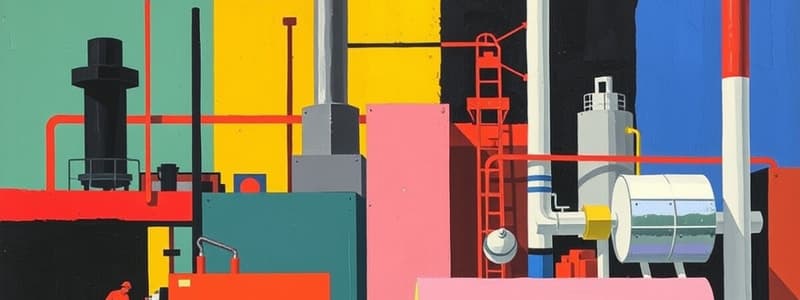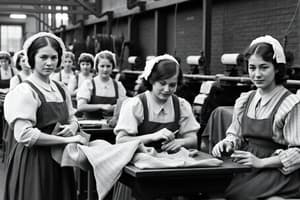Podcast
Questions and Answers
Before the _____s, the factory had still not become typical of American industry.
Before the _____s, the factory had still not become typical of American industry.
1850
Not until the 1850s did ______ and ______ begin to adopt power-driven machinery.
Not until the 1850s did ______ and ______ begin to adopt power-driven machinery.
Hat making or shoe making
What is usually a distinctive feature of the factory system?
What is usually a distinctive feature of the factory system?
Power driven machinery
Who was Frances Cabot Lowell?
Who was Frances Cabot Lowell?
Where was the Lowell factory located?
Where was the Lowell factory located?
Main features of the plant in 1822 involved what?
Main features of the plant in 1822 involved what?
What was the Lowell system designed to be?
What was the Lowell system designed to be?
What type of workplace did the Lowell system want to avoid?
What type of workplace did the Lowell system want to avoid?
Where did Lowell owners locate their mills?
Where did Lowell owners locate their mills?
The Lowell system attempted a program of _____ ______ for the workers.
The Lowell system attempted a program of _____ ______ for the workers.
The workers were mainly _____ ______ who could be paid less than men.
The workers were mainly _____ ______ who could be paid less than men.
What did owners promise parents for their daughters?
What did owners promise parents for their daughters?
Initially, 'The Lowell System' worked well. Workers appeared to be healthy and happy despite ______________________.
Initially, 'The Lowell System' worked well. Workers appeared to be healthy and happy despite ______________________.
What regulatory measures did the matronly supervisors enforce?
What regulatory measures did the matronly supervisors enforce?
After working at their knitting looms, some women formed ______________________.
After working at their knitting looms, some women formed ______________________.
What problems did the Lowell system face?
What problems did the Lowell system face?
Flashcards are hidden until you start studying
Study Notes
Lowell System Overview
- The 1850s marked a significant shift in American industry from handicraft to factory systems.
- Factories began adopting power-driven machinery, particularly in hat and shoe making.
Frances Cabot Lowell
- Lowell established the first factory integrating spinning and weaving processes under one roof in Boston.
- His factory mechanized production from raw materials to finished cloth, revolutionizing textile manufacturing.
Factory Features
- The Lowell factory, operational in 1822, required significant capital investment.
- It centralized all processes under unified management, focusing on producing coarse cloth that required minimal skills from workers.
Social Structure and Goals
- The Lowell system aimed to enhance social fabric by creating a model factory and community, avoiding drab and appalling work environments.
- Mills were strategically located in the countryside to foster a healthier lifestyle for workers.
Labor Dynamics
- Workers primarily consisted of young women, who were paid less than male counterparts.
- The factory owners assured parents of several benefits for their daughters, including comfortable housing, moral discipline, and educational opportunities.
Working Conditions
- Workers endured long hours, typically 13-hour days, six days a week, yet seemed initially satisfied with their conditions.
- Supervision was stringent, with dormitory living overseen by matrons enforcing church attendance, drinking regulations, and curfews.
Cultural Development
- Some women participated in study groups, edited a literary magazine, and attended lectures after their shifts, pursuing personal development.
Challenges Faced
- In the 1830s, declining textile prices and mill wages led to strained relations between workers and management.
- Faster production demands resulted in organized strikes from women protesting poor working conditions, highlighting flaws in the Lowell system.
Studying That Suits You
Use AI to generate personalized quizzes and flashcards to suit your learning preferences.





